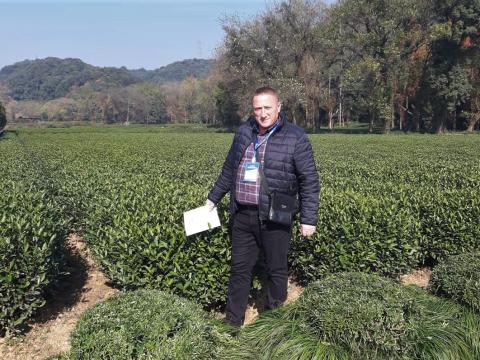In my community

If you want good local produce like from the area of Librazhd, Shpëtim Cura, who has the best knowledge in the field, for sure will not disappoint you. Reticent and always willing to let the actions speak louder than words, he joined World Vision Albania 15 years ago as a Development Facilitator within the ‘Economic Development of Families’ project.
“As a teacher, my greatest wish was to contribute to the education of children and teenagers, and be able to provide them opportunities to get education or at least to learn a craft. A decade in the field of education and the decision to build my future home in Librazhd (and not emigrate like most of my peers) gave me the certainty to begin a new professional challenge by joining an international organization as World Vision Albania,” tells us Shpëtim, now father of two grown up children.
When he first started working in the humanitarian sector, the country was still in its first transition stages. As Shpëtim remembers, families, including children and youth and communities, were still facing great social and economic issues. At that times, the main source of income in Librazhd were allowance’s (remittances).
“Initially, about 15 years ago, I was part of an assessment conducted by World Vision on the economic situation in the area. As a result of the assessment we received some data which guided us on what kind of prorammes and intervention were needed in the area,” tells Shpëtim.
He recalls participating in many valuable trainings that equipped him with knowledge that has driven his work in the field over the years.
“I am glad I was able to integrate teaching methodologies into the social programmes implemented by World Vision. While helping my community, I was also transforming and growing professionally. The first five years working as a development facilitator, were a turning point that shaped last two decades of my career and my passion,” he reveals.
Shpëtim says that local farmers greatest struggle is to take care of their products until harvest. However, this is only the first glance, because he states that there were several external factors, such as mentality, that defines the way of life in this part of Albania.
“I remember ‘the masked sale’ farmers used to do under the pretence that they didn’t want people to know how much produce they had, since that could be harmful to the bees or the produce. At the time, this was a superstition. Nowadays, such approaches are not adequate (at least in our area), and farmers are united in markets while presenting labelled products in joint markets. Gender equality constitutes another element. Men as head of the household felt ashamed to go to the market to sell their home-products. Nowadays we are still making efforts to overcome gender inequalities, as well as focus on the needs of the children and the entire family. Another aspect was the area’s tradition of not raising rabbits or pigs, since according to farmers ‘it was not a good luck’. For more than one-decade, World Vision has invested in increasing farmers’ capacities and also supporting in agricultural investments which has brought obvious changes,” says Shpëtim happily.
While organizing farmer groups, including women and men, in Building Secure Livelihoods program, World Vision worked to address gender issues helping to increase their capacities. Farmers became experts in treating cultivated crops in the area, coordinate and support each other despite gender. Having a higher level of expertise, they are now advocating on issues concerning their community.
“Currently, in the area of Librazhd, families are stronger economically and many young people attend higher education. Participation of farmers in trainings such as income management and handling natural resources, as well as participation of housewives and young people in various vocational courses, contributed to the new and better way the community started to handle economic development. Dozens of young people and women now have a profession and can support their families. They can also provide fast and quality service for the community thanks to the vocational courses they graduated from,” mentions Shpëtim emphasising the need of employment for youth.
There are many stories of farmers he could tell, but his phone keeps ringing even after business hours. For Shpëtim there are no schedules when he is facing difficulties. He tries to be a model for his children by teaching that education, commitment, passion and humanity are the most important values that will help them thrive in their future.
“The reason I have committed to this job for this long is my wish to provide continuous support to the community and help solving problems. I try to share my experience with my children and everyone who wants to be useful to their families and friends,’’ says Shpëtim.
He has a message for everyone, ‘’Let’s stop browsing through the internet for a moment, let us have a face to face discussion on issues that impacts our lives’’.
Shpëtim went through a long path to help improve the livelihoods of families in his community and secure a better life for the younger generation.